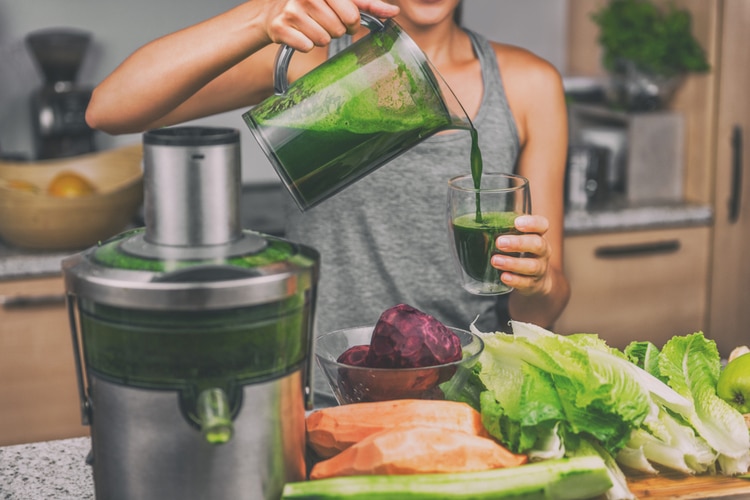How To Detox Your Liver The Healthy Way
In today’s fast-paced world, it’s easy to overindulge in rich foods and alcohol, which can put a significant strain on your liver. This vital organ performs numerous functions essential for maintaining good health, including filtering toxins from the blood, metabolizing nutrients, and storing certain vitamins. Unfortunately, many individuals are unaware of the importance of detoxifying their liver and the simple steps they can take to do so naturally. In this article, we will explore why liver detoxification is necessary, how to recognize signs that your liver may need attention, and actionable methods to support your liver’s health through dietary and lifestyle changes. Together, we will embrace the idea that a healthy liver leads to a healthier life.
Understanding the Role of the Liver

The liver is an extraordinary organ, often referred to as the body’s chemical factory due to its multifaceted roles. It’s crucial to understand how the liver functions to appreciate the importance of detoxifying it properly.
Primary Filtration System
One of the liver’s primary functions is acting as a filtration system. Every day, your liver processes approximately one liter of blood, removing harmful substances and impurities. As it filters out toxins like drugs and alcohol, it also eliminates waste products while ensuring that essential nutrients remain available for your body’s use.
This filtration process is not just limited to external toxins; your liver is also responsible for breaking down metabolic byproducts from the digestion of food. For instance, when you consume protein-rich foods, the liver converts ammonia—a toxic byproduct—into urea, which can be excreted safely through urine.
Nutrient Metabolism and Storage
The liver acts as a storage facility for vitamins and minerals, including Vitamin A, B12, D, E, and K. These nutrients can be stored for extended periods, waiting to be utilized by the body when needed. Additionally, the liver plays a vital role in converting carbohydrates into glucose, releasing it into the bloodstream when energy demands increase.
This regulation of blood sugar levels is crucial for maintaining energy balance throughout the day. When your liver is functioning optimally, it ensures that nutrient absorption occurs smoothly, enhancing overall well-being.
Bile Production and Digestion
Another essential function of the liver is bile production. Bile aids significantly in fat digestion and absorption by emulsifying fats, allowing enzymes to break them down more efficiently. Despite its common negative connotations, bile is critical for healthy digestion and nutrient assimilation.
Moreover, bile facilitates the absorption of fat-soluble vitamins (A, D, E, and K), underscoring the importance of liver health in overall nutritional status. A poorly functioning liver can lead to compromised digestion, resulting in symptoms such as bloating, gas, and nutrient deficiencies.
Recognizing Signs of Liver Distress
It’s essential to be vigilant about the signs that your liver may need a detox. Although some symptoms can be easily overlooked, recognizing these indicators is pivotal for taking proactive measures.
Jaundice: A Yellow Flag
Jaundice, characterized by yellowing of the skin and eyes, is one of the most noticeable signs that your liver is struggling. This condition arises when bilirubin—a substance produced during the breakdown of red blood cells—accumulates in the body. An unhealthy liver may not effectively process and eliminate bilirubin, leading to its buildup and the associated yellow tint.
If you notice jaundice, it serves as a warning signal that you should consult with a healthcare professional for further evaluation and potential intervention.
Digestive Discomfort and Altered Appetite
Experiencing digestive issues such as heartburn, acid reflux, or bloating may indicate that your liver needs attention. Since the liver plays a role in fat metabolism and bile production, disturbances can lead to malabsorption and discomfort after eating—particularly after consuming fatty or rich meals.
Additionally, a sudden loss of appetite or increased cravings could signify that your liver isn’t effectively processing nutrients, causing an imbalance in your metabolic system. Recognizing these shifts can provide critical insights into your liver health.
Mood Changes and Cognitive Effects
The liver’s health can have a profound impact on mental well-being. Individuals may experience mood swings, anxiety, or depressive symptoms when the liver is under stress. Furthermore, cognitive functions such as memory and concentration may decline, resulting in feelings of confusion or brain fog.
These psychological effects arise as the liver struggles to filter toxins from the body effectively, causing potentially detrimental substances to circulate through the bloodstream and affect the brain. If you find yourself experiencing persistent mood changes or cognitive difficulties, it may be time to consider a liver detox.
Steps to Detox Your Liver Naturally

Now that we’ve established the importance of liver health, let’s dive into effective methods to detoxify your liver the healthy way. By making specific dietary adjustments and lifestyle choices, you can support your liver in functioning at its best.
Embrace Potassium-Rich Foods
A diet abundant in potassium is essential for optimal liver function. Potassium helps maintain proper fluid balance in the body and supports the liver’s ability to filter toxins efficiently. Fortunately, you don’t need supplements to increase your potassium intake!
Incorporate potassium-rich foods such as bananas, sweet potatoes, spinach, and legumes into your daily meals. These foods not only provide valuable nutrients but also contribute to overall gastrointestinal health, promoting regular bowel movements that help eliminate toxins from the body.
Try starting your day with a banana smoothie or adding sweet potatoes to your dinner for a nutritious potassium boost.
Eliminate Processed and Fatty Foods
Processed and high-fat foods can introduce harmful chemicals and trans-fats into your system. These substances can overwhelm your liver, making it harder for it to perform its detoxification duties. To give your liver a fighting chance, focus on eliminating processed foods high in refined sugars, unhealthy oils, and preservatives.
Instead, opt for whole, unprocessed foods. Fresh fruits and vegetables, lean proteins, and whole grains are excellent choices that nourish your body while being easier for the liver to process. Cooking at home allows you to control the ingredients you use, ensuring every meal is liver-friendly.
Juicing for Quick Absorption
Juicing raw vegetables can be an effective way to detox your liver. While a full juice cleanse may not be necessary, incorporating fresh vegetable juices into your routine can enhance nutrient absorption and make it easier for your liver to process these vital components.
Consider creating juices with liver-boosting ingredients like carrots, beets, and leafy greens. These vegetables are packed with antioxidants and nutrients that support liver health. Drinking vegetable juices regularly can aid in detoxifying your liver while providing hydration and essential vitamins.
Harness the Power of Turmeric and Ginger
Turmeric and ginger are two powerhouse ingredients known for their detoxifying properties. Turmeric contains curcumin, a potent antioxidant that supports healthy liver metabolism and combats inflammation. Including turmeric in your cooking or taking it as a supplement can bolster liver function.
Ginger, on the other hand, possesses anti-inflammatory properties that soothe the digestive tract and help alleviate nausea. Incorporating both turmeric and ginger into your diet can create a powerful synergy, enhancing your liver’s ability to detoxify itself.
Manage Stress Levels
Stress has far-reaching impacts on our bodies, including liver health. Chronic stress leads to elevated cortisol levels, which can compromise liver function. Implementing stress-reduction techniques is crucial for maintaining a healthy liver.
Yoga, meditation, and mindfulness practices can help lower stress levels and promote relaxation. Finding time for physical activity can also play a significant role in managing stress, as exercise releases endorphins that elevate mood and improve overall well-being.
Explore activities that resonate with you, whether it’s nature walks, yoga classes, or spending time with loved ones, to carve out moments of joy amidst life’s challenges.
Conclusion
Detoxifying your liver doesn’t require expensive supplements or extreme diets—it simply means making conscious decisions about what you put into your body and how you treat it. By understanding the functions of the liver and recognizing the signs of distress, you are already taking important steps toward better liver health.
Embracing a nutrient-rich diet, eliminating harmful foods, utilizing the natural goodness of herbs and spices, and practicing stress management can all work harmoniously to support your liver. Remember, your liver is resilient and capable of regeneration if treated with care. Prioritize liver health today, and you’ll reap the benefits of a vibrant, energetic life tomorrow.






